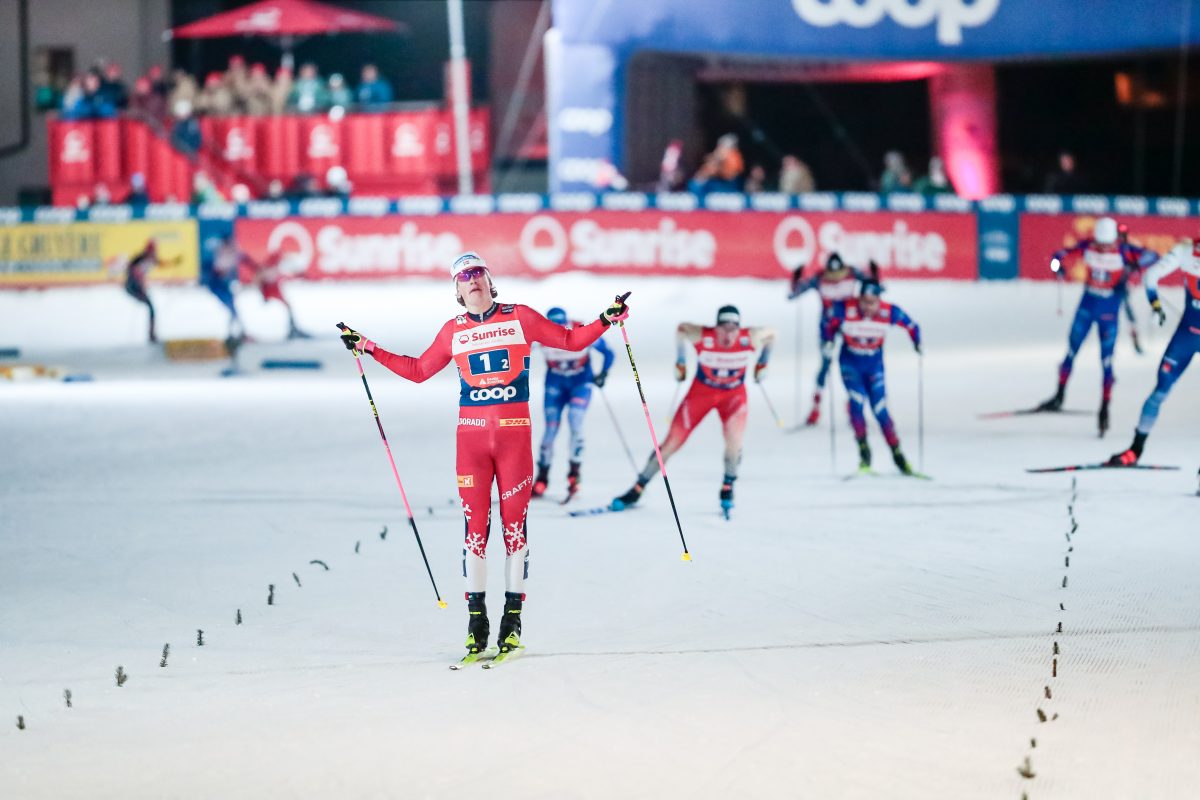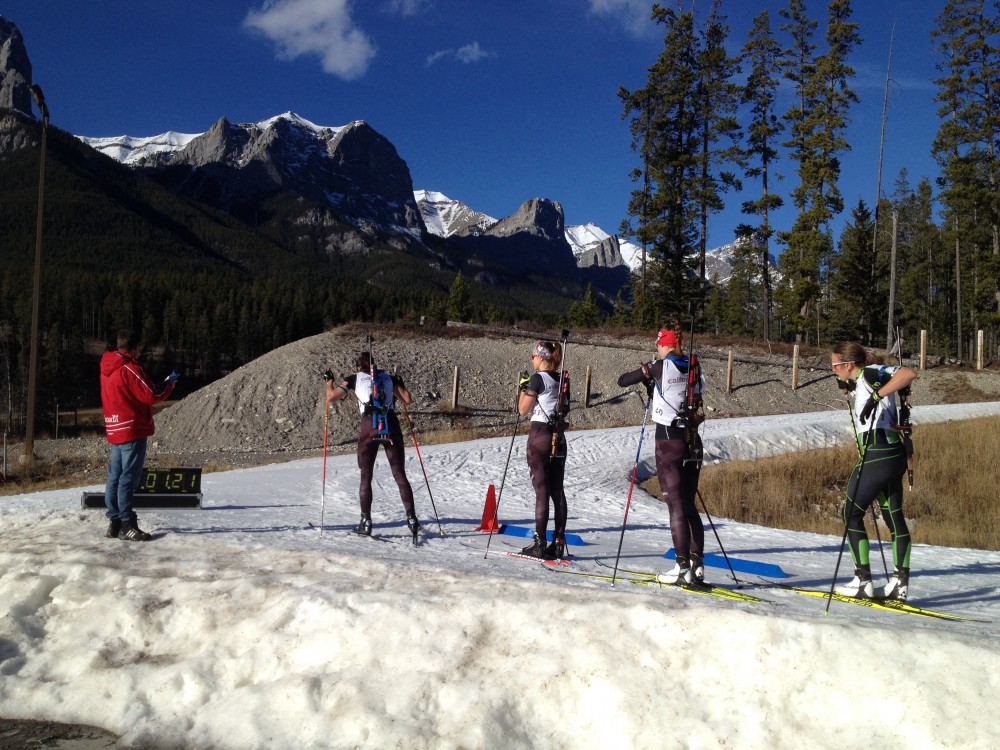
(Note: Biathlon Canada’s World Cup team trials wrapped up last Thursday, but selections had not been publicized as of Monday. Stay tuned for the final team selection details.)
While pushing past the overgrown, browning grass lining the Canmore Nordic Centre’s shooting range last Wednesday, Rosanna Crawford could feel the pressure.
Not pressure to qualify for a team, pressure to prove she deserved her preselected spot on Biathlon Canada’s A (officially “Eh!”) squad.
The 28-year-old team veteran did just that by the end of Biathlon Canada’s two-day team selection races, which ran this year from Wednesday, Nov. 9 to Thursday, Nov. 10 at Frozen Thunder in Canmore, Alberta. Crawford took the wins in both women’s sprint events. However, even after winning Wednesday’s 7.5-kilometer sprint by more than 30 seconds, Crawford wanted more from her shooting after she missed three shots (2+1).
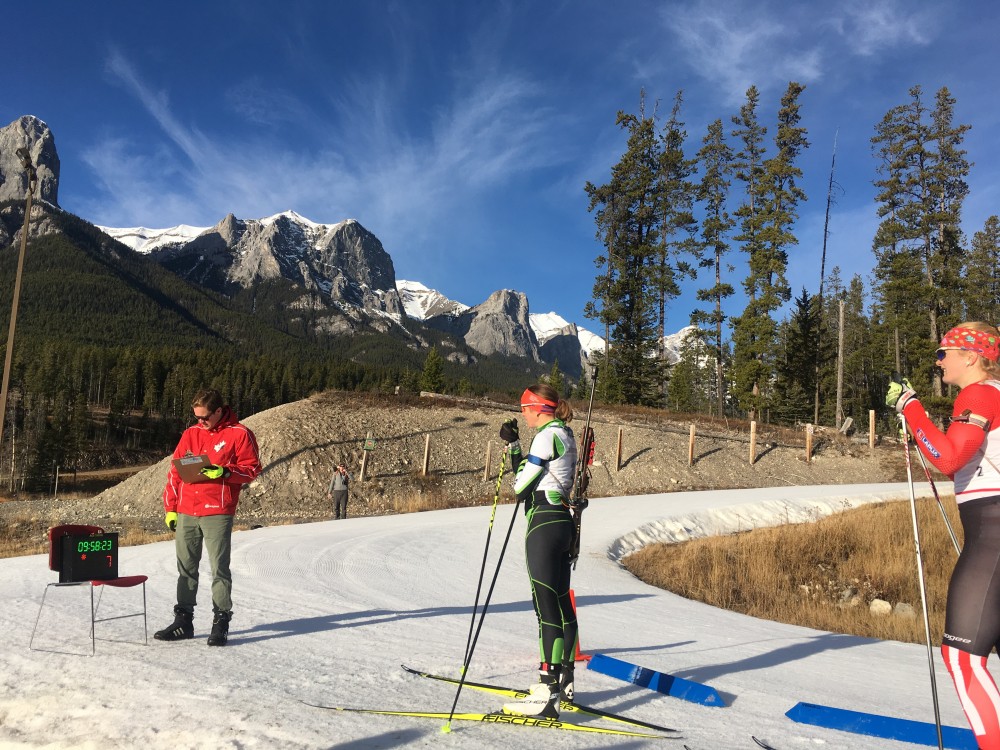
“With being pre-qualified you always want to prove that you deserve to be pre-selected,” Crawford wrote in an email on Wednesday. “I had high focus and expectations for shooting and am really disappointed with 3 misses, that won’t do on the World Cup. I have been training quite a bit leading into these races, so I am looking at it as a good chance to practice pushing hard while tired and shooting well. Today was a mentally and physically draining race, but conditions that we might encounter in the winter.”
Crawford explained that Wednesday’s conditions were particularly challenging, with a fair amount of wind and temps hovering above 16 degrees Celsius, turning the 2.6 k race loop into slush.
“It was quite windy and not really consistent which definitely hurt people on the range,” Crawford wrote. “My race started off with a good first lap and then it turned into a slow crawl by the finish, it just got slower and slower as the sun beat down on the tracks. We did the same race [format] on November 4th which took 21 minutes, and today [Wednesday] was 27 minutes!”
US Biathlon national-team members Joanne Reid and Susan Dunklee also competed in Wednesday’s competition, finishing second and third, respectively. Reid clocked in 34.4 seconds back from Crawford’s time with three misses (1+2) and Dunklee also finished with three misses (2+1), 35.5 seconds behind Crawford. Reid explained that for the U.S. women, competing in the time trial provided an opportunity to fine tune their racing prior to the official start of the IBU World Cup season.
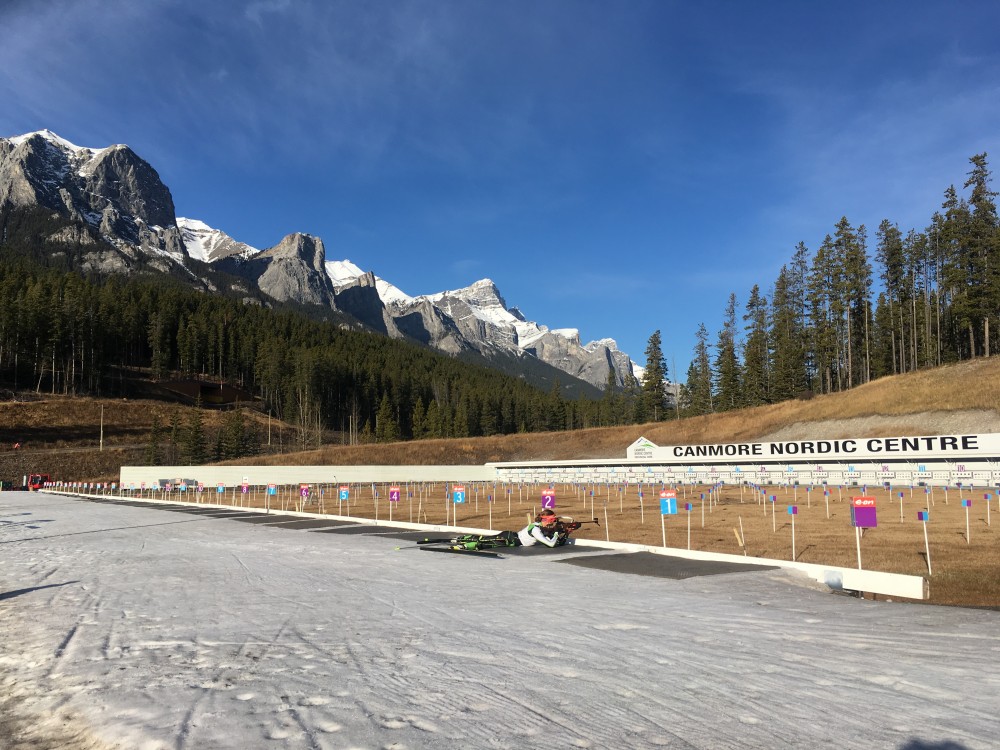
“Since our trials races are over and the women’s team is already selected, there is no results pressure for us. Instead we are focusing on getting all the pieces together to launch into a successful first period of the World Cup,” Reid wrote of herself, Dunklee and Clare Egan, all on the U.S. women’s biathlon team, in an email on Wednesday. “All three of us are still adapting to some changes, different trigger weights, entirely new actions, sight risers, that sort of thing, so these time trials were just about practicing these new developments in a race environment.”
In Thursday’s women’s 7.5 k sprint, Crawford repeated with another victory, completing the course in a time of 22:08.2 with three misses (2+1). While desiring better shooting, Crawford remained optimistic about being able to hone in on her accuracy within the next few weeks.
“Today was a lot better than yesterday, I think it went below freezing and conditions stayed pretty hard and consistent through the women’s race,” Crawford wrote in an email on Thursday. “Still really frustrated with my shooting, prone has actually been quite good this summer and fall, so not sure what has changed. But I’ve got 3 weeks to get things back to normal, and feel confident that things will be better come the race season.”
Finishing 3.5 seconds off the winning time, after cleaning prone but missing two standing shots (0+2), was Crawford’s teammate Julia Ransom in second place. Following Ransom, 8.2 seconds back from Crawford with one miss (0+1), was Megan Tandy (also of Biathlon Canada) in third.
In the men’s 10 k sprint, Volodymyr Siemakov of Ukraine took first on Wednesday, finishing the 10 k in a time of 28:36.0 with one miss (1+0). Finishing 4.5 seconds behind Siemakov in second after shooting clean was US Biathlon’s Lowell Bailey. In an email, Bailey explained that even with temperatures better saved for summer, Wednesday’s race was a good start to his on-snow season.
“I think of these competitions as a ‘test-run’ for the upcoming world cup,” Bailey wrote on Thursday. “These races are a good chance to try out all of the new elements I’ve been working on throughout the training year. After two races, I’ll analyze the weak points of those performances and focus my energy on those areas in the lead-up to Östersund.”
In third, 8.9 seconds behind Siemakov was another Ukrainian skier, Artem Pryma, with two missed shots (0+2).
Canada’s top man on Wednesday was Biathlon Canada’s Scott Gow in sixth, 45.5 seconds behind Siemakov with one miss (0+1). Gow indicated that given Wednesday’s conditions, he was satisfied with his performance and the direction his summer and fall training have taken him prior to the start of the ski season.
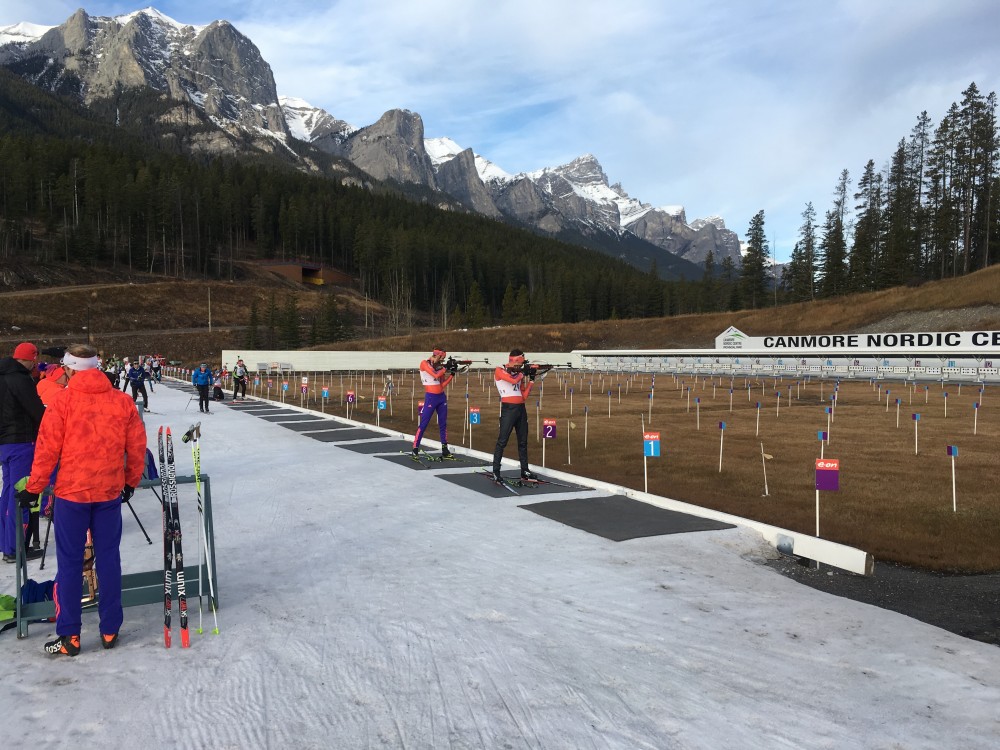
“It was a very warm morning with very slushy, slow snow so it was a challenge to push through and stay motivated,” Gow wrote in an email on Wednesday. “It was also tricky wind conditions during zero, and there were gusts of wind during the race. Being able to shoot 90% and suffer through the skiing was a big plus for my confidence…I don’t think I will change very much heading into the next few weeks. I’m happy with my prep and performances at this point and I don’t want to mess with a good thing.”
Gow was also the leading Canadian man on Thursday, placing third, 1 minute and 8.6 seconds behind US Biathlon’s Tim Burke, who won in 24:38.9. Burke shot clean, while Gow had four misses (0+2+2+0). Finishing in second again was Bailey with two misses (1+0+1+0), 44.5 seconds behind Burke.
“It was great to start the winter season off with two races in Canmore, but I am definitely not reading too much into the results,” Burke wrote in an email on Friday. “Most athletes are training through these races and everyone is in different stages of preparation for the season. I am happy with my execution on the shooting range [Thursday]. The conditions were a bit tricky, with some wind gusts, so I was happy with a clean race. ”
Gow explained that, as an athlete who is already prequalified for Canada’s World Cup team, the races offered him the chance to experiment with his racing tactics prior to the start of another season.
“I didn’t have to worry about the pressure of needing to perform and instead could focus on using these races as a tune-up,” Gow wrote. “My main goals were to push the ski speed and race right near the line where I am almost out of control, but also be able to come in to the range with a clear mental focus. I accomplished that [Wednesday], which makes me happy … I was definitely able to push the ski speed again [Thursday] … Now the key is to maintain confidence without becoming too over confident.”
Gabby Naranja
Gabby Naranja considers herself a true Mainer, having grown up in the northern most part of the state playing hockey and roofing houses with her five brothers. She graduated from Bates College where she ran cross-country, track, and nordic skied. She spent this past winter in Europe and is currently in Montana enjoying all that the U.S. northwest has to offer.

